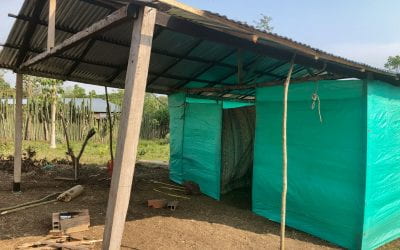Let’s Talk about Resilience
The Pandemic and Domestic Workers in Latin America and the Caribbean
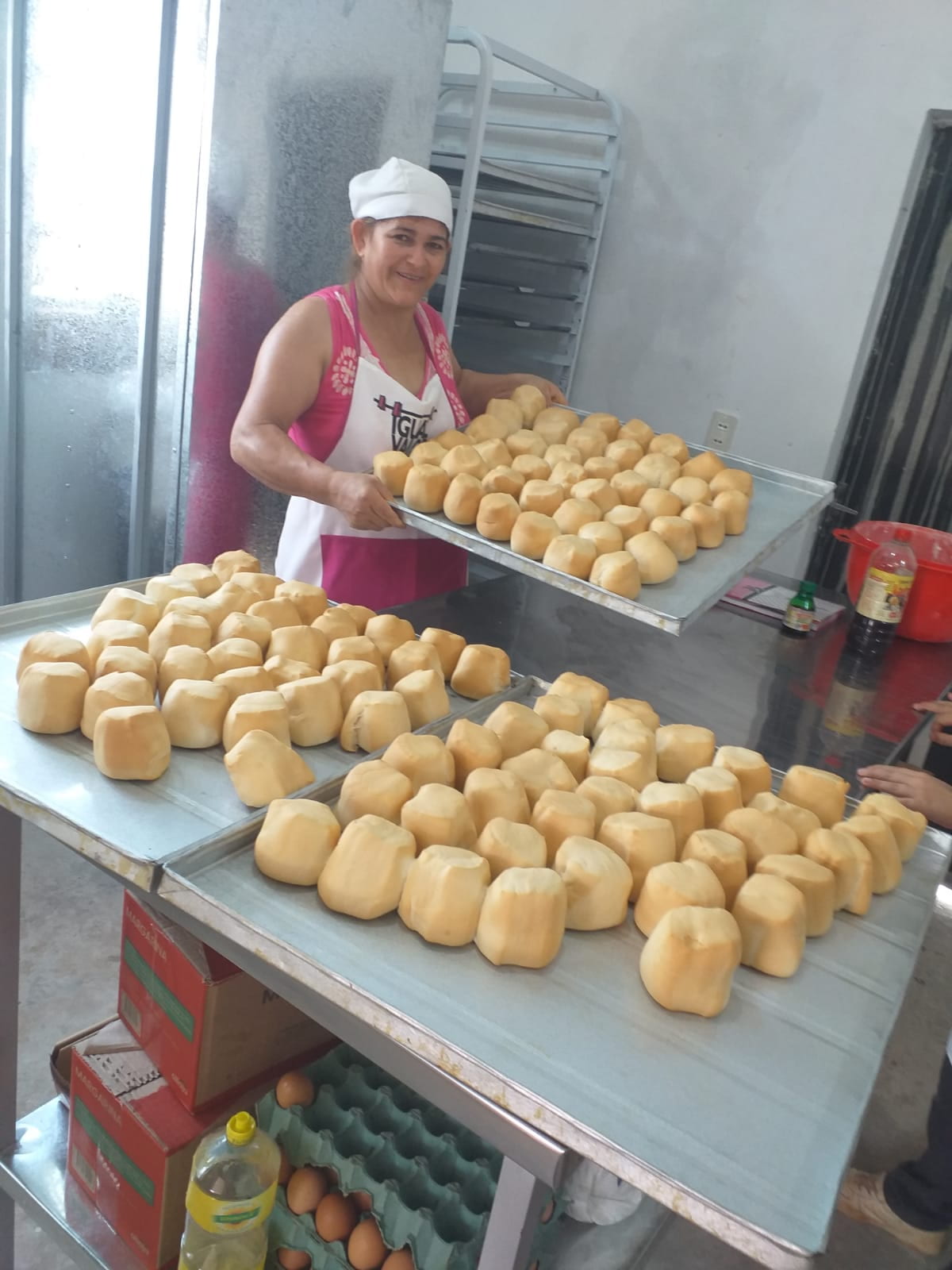
SINTRADI, of Paraguay, launched a bakery to generate incomes and jobs for the workers most impacted by the pandemic. (Photo Courtesy: SINTRADI)
When I joined the International Domestic Workers Federation (IDWF) family in October 2019, I never imagined that a few months later I would experience both the pain and the privilege—the ironies of life—of seeing the regional movement of domestic workers fighting one of the toughest battles in their history, the one caused by the Covid-19 crisis, and coming out of it stronger.
In the last two years, I have witnessed how domestic workers’ labor and human rights in my beloved region were violated in every possible way. I have seen a painful display of callousness on the part of employers and governments. I have seen social injustice at its best: the women most exposed to the health and economic crisis have also been the most forgotten and least favored.
However, in these times, I have also understood the meaning of two terms that are talked about a lot but are not always fully characterized: resilience and empowerment. Far from being intimidated by the adverse reality, the leaders of the region’s union organizations of domestic workers knew how to capitalize on this unprecedented crisis, reclaiming their demands, making their rights visible and advocating for their appeals to be included in public agendas. And all with exceptional creativity and a strategic vision that entrepreneurs would envy. These wise women saw opportunity where others saw desolation. These enlightened lionesses reinvented themselves in record time and thus reaped unimaginable victories amid the storm. That is why I can proudly say that I have had the “privilege” of going through the Covid-19 crisis with domestic workers in Latin America and the Caribbean. Today I want to share with the world this experience that changed me forever.
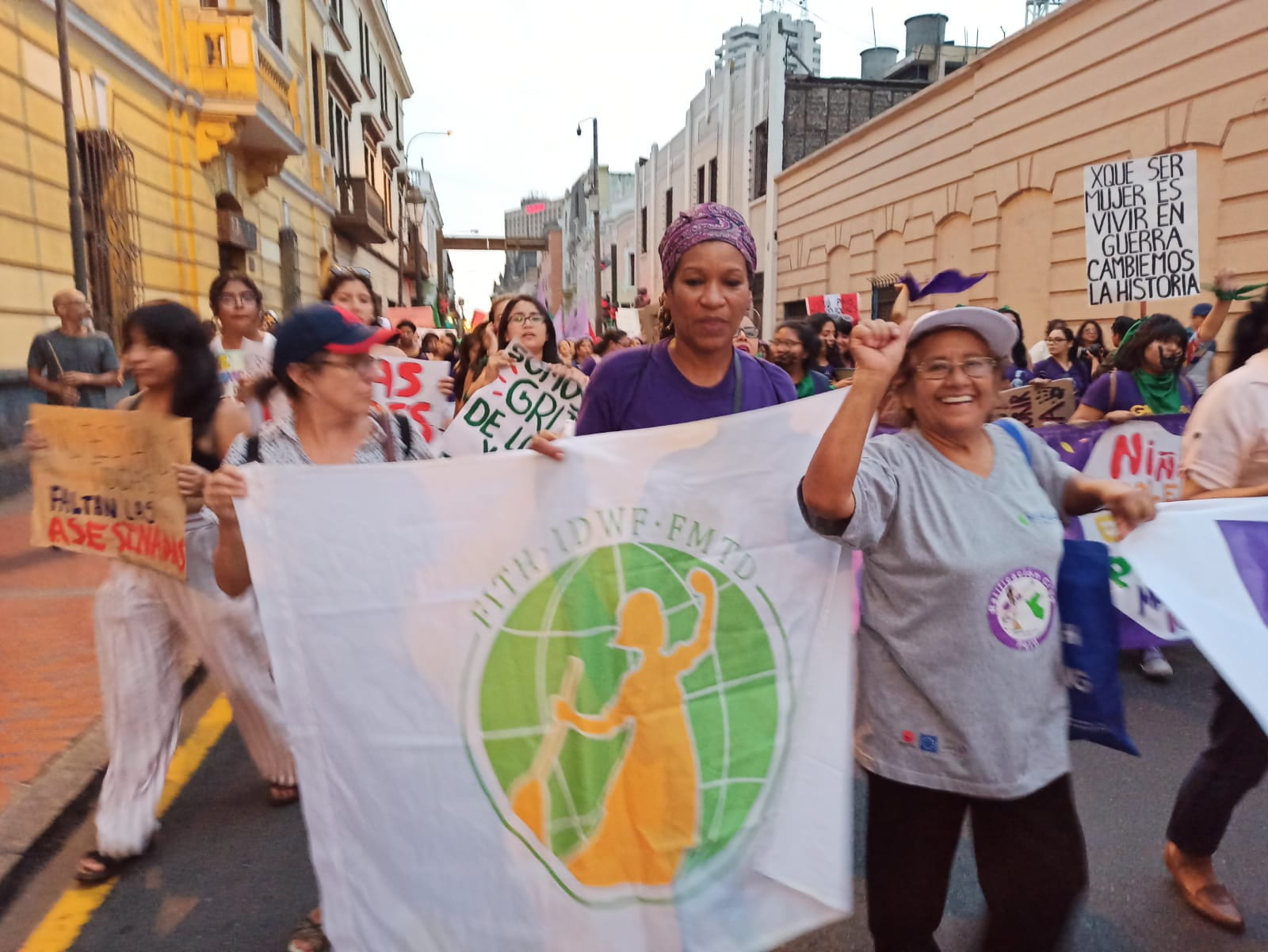
Peruvian domestic workers celebrate a historic victory: the passing of a law which grants them the same rights as formal-sector worker. (Photo Courtesy: FENTRAHOGARP)
What the Pandemic Left Us
More than 15 million people are engaged in domestic work in the region, according to the latest data from the International Labor Organization (ILO, 2021), in Latin America and the Caribbean. Of these, 92% are women, and 72.3% provide their services without a formal contract. In addition, their salaries do not reach half of what other salaried workers receive. These figures show a brutal contradiction between regulations and practice, considering that, of the 35 countries that have ratified ILO Convention 189 on decent work for the sector worldwide, 18 belong to the region.
In this context, Latin American and Caribbean domestic workers have been the most affected by the Covid-19 pandemic in terms of job losses, reduced working hours and decreased income because many employers did not want to risk contagion by having someone come in from outside. As of the second half of 2020, about half of them had lost their source of income, and only 9.8% were fully covered by social security (ILO, 2021), which means they had limited access to health services. In some countries, the effects of the pandemic were particularly devastating during that period: in Peru, 72.1% of domestic workers lost their jobs; in Ecuador, 53.3%; and in Colombia, 50.6%.
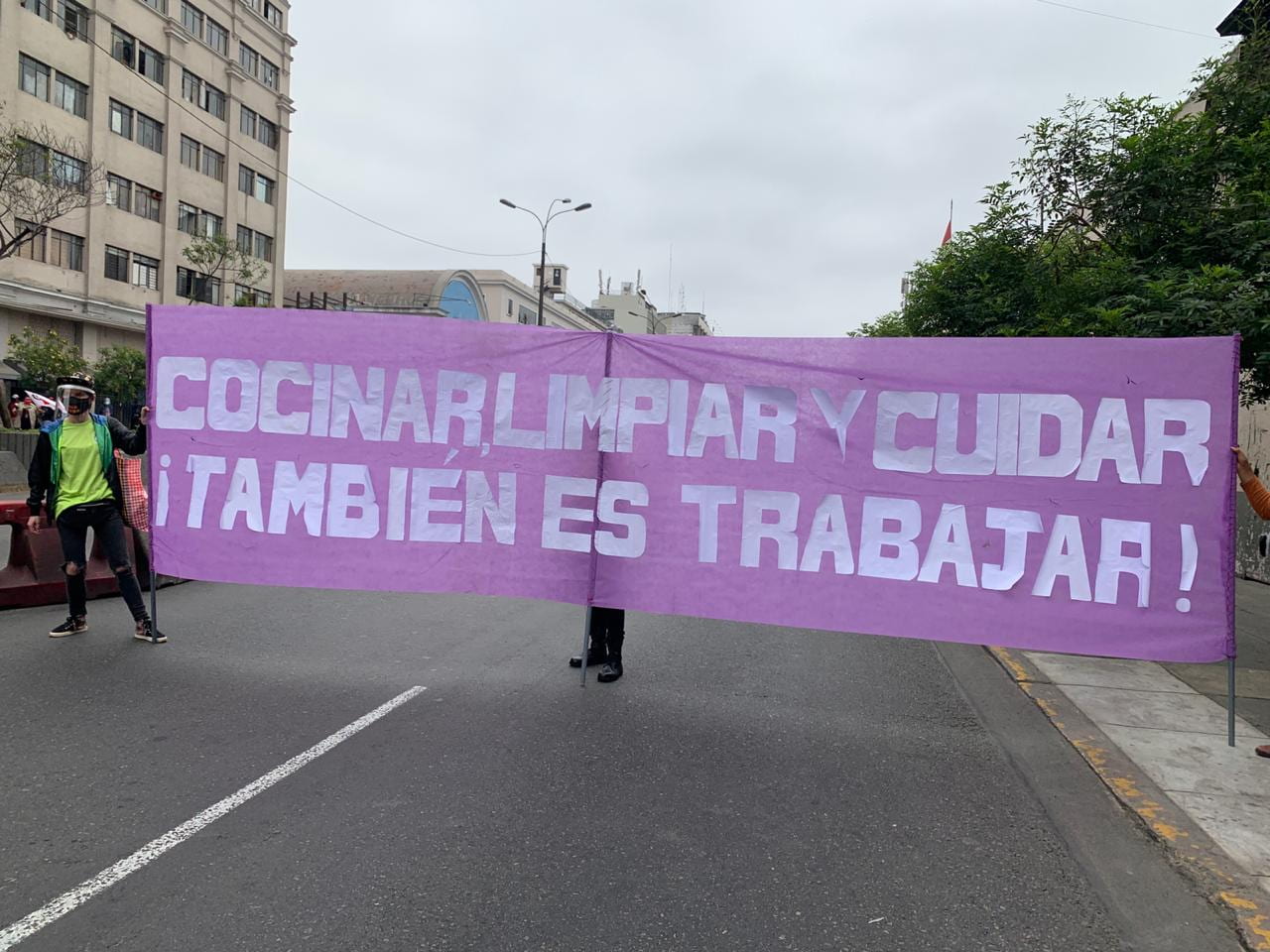
Peruvian domestic workers take to the street to advocate the importance of recognizing domestic work as actual work, just like any other profession. (Cortesía de SINTTRAHOL)
The results of a survey promoted by the IDWF (2020) add that 14.2% of them kept their jobs, but with worsened working conditions. Meanwhile, 23.1% continued to work, translating into greater exposure to the virus. Only 13.8% of the workers consulted reported that their employers respected their right to paid quarantine. It should be noted that 92% of those surveyed indicated that domestic work was their only or primary source of income. In addition, 68% of them represented the only monetary contribution to the family economy.
As we can see, the lack of protection and informality that characterize the sector has manifested in various ways in the face of the Covid-19 crisis. Given that most domestic workers do not have a written employment contract or are registered with social security, many employers interrupted the employment relationship during the pandemic without recognizing any rights and without paying their wages. But those who kept their jobs often suffered abuses of all kinds. The confinement of entire families in homes implied a greater demand for cleaning and care services. Hence, many domestic workers have been forced to remain in their workplaces during mandatory isolation, resulting in an overload of tasks, longer hours, lack of adequate rest, inability to see their own families, greater exposure to the coronavirus and a high probability of suffering the psychosocial effects derived from such a stressful situation.
On the other hand, few domestic workers in the region were able to access the assistance mechanisms provided by the governments: barely 40%, according to the IDWF survey. This is both because of their situation of labor informality (most of these measures were aimed at registered workers) and the difficult online procedures required to apply for these benefits.
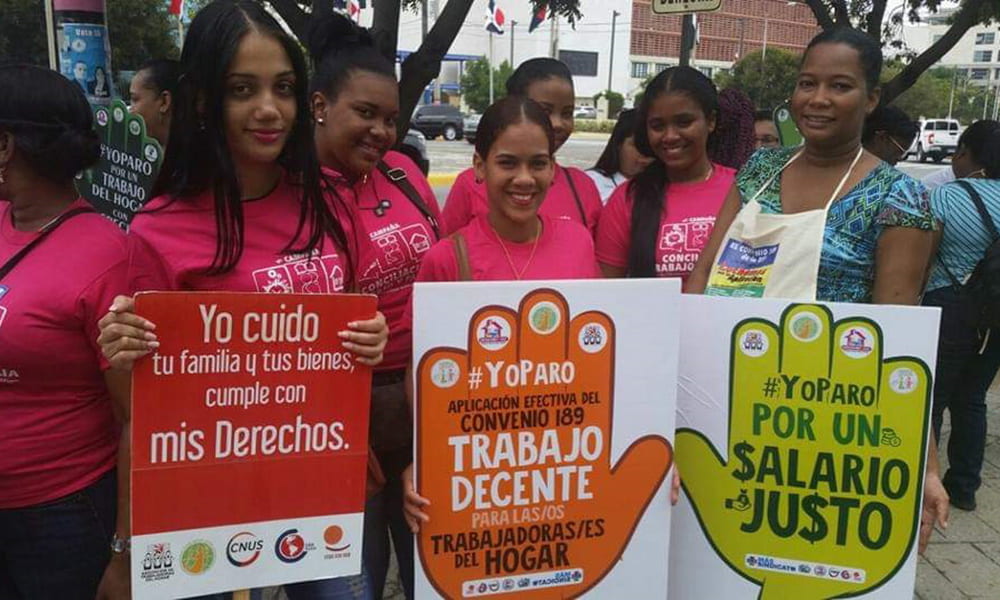
Organizations of Dominican domestic workers march to demand their rights be respected during the pandemic. (Photo Courtesy: ATH)
The effects of the pandemic have been particularly devastating for women workers belonging to less favored social groups. It is no coincidence that the first fatal victim of Covid-19 in Brazil was a 63-year-old Black domestic worker with diabetes who was infected by her employer when she returned to Rio de Janeiro from a trip to Italy. But the peak of the horror came on June 2, 2020, in the city of Recife (Pernambuco, Brazil), with the death of Miguel Santana, the five-year-old son of an Afro-descendant domestic worker whose right to paid quarantine was not respected by her employer. Given the suspension of school classes, Mirtes Santana was forced to take her child to work and leave him momentarily with her employer while she walked the family dog (a task beyond her duties). The employer/owner of the house, annoyed, mounted Miguel in the elevator of the building towards the terrace, from where he fell and lost his life. Stories like this move us to a serious reflection on the share of responsibility of each member of society and on social injustice.

At the height of the pandemic in Brazil, Fenatrad launched the “Our Rights are Essential” campaign, demanding the formalization of the sector and paid quarantine for all domestic workers. (Photo Courtesy: Themis – Gênero, Justiça e Direitos Humanos / FENATRAD)
Our Warriors in Action
I applaud the organizations of domestic workers in Latin America and the Caribbean, who, in the midst of unprecedented health and economic crisis, have been able to mobilize more than ever to defend their rights, putting governments and employers in check. This article would not be enough to list everything these women have done in the last two years.
With the flag of “Take care of those who take care of you” held high, our leaders emerged stronger from the crisis. They learned lessons, got up to date, revalued regional unity, made strategic alliances and deployed all their capacities through phenomenal awareness and visibility campaigns. They put solidarity into practice without reservation, depriving themselves of bread or medicine to alleviate the suffering of their companions. This demonstration of greatness dignifies and exalts them even more. And when the body and the soul are delivered in this way, the fruits are harvested even if the storm rages.
In the most chaotic moment, domestic workers in Peru obtained a historic victory: the approval of a specific law for the sector that equated their rights with those of other workers, achieving that written contract be mandatory. The leaders of Chile gained the long-delayed access to unemployment insurance and their inclusion in the Emergency Family Income. The Salvadoran sisters finally managed to get the courts to rule in their favor to set a minimum wage for domestic workers. The Mexican leaders took to Congress their proposal to reform the Social Security Law. The Dominican champions managed to access the “Stay at home” program, placed their demands on the government’s agenda and even founded a cooperative to ensure institutional sustainability and promote income generation among its members. With sheer effort and a limited budget, the warriors of Paraguay opened their bakery. The unstoppable Argentines inaugurated a Women’s Center to assist workers who are victims of gender violence. Uruguayan, Argentinean, Ecuadorian and Peruvian women assumed a vital role in the ratification of ILO Convention 190 against workplace violence and harassment in their countries.
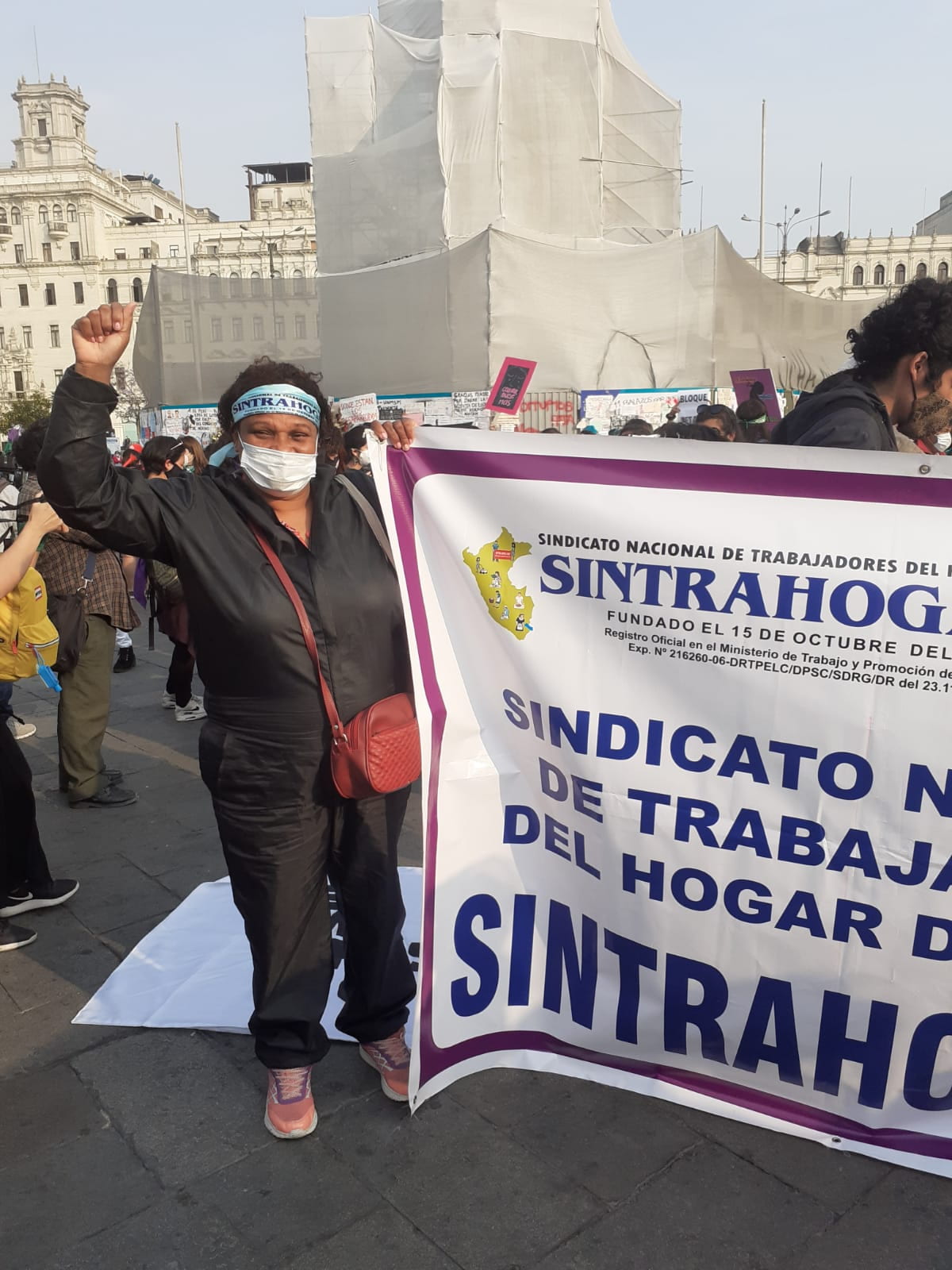
Peruvian domestic workers protest for the ratification of ratification of the OIT’s Convention 190 against violence and abuse of workers. (Photo Courtesy: FENTRAHOGARP)
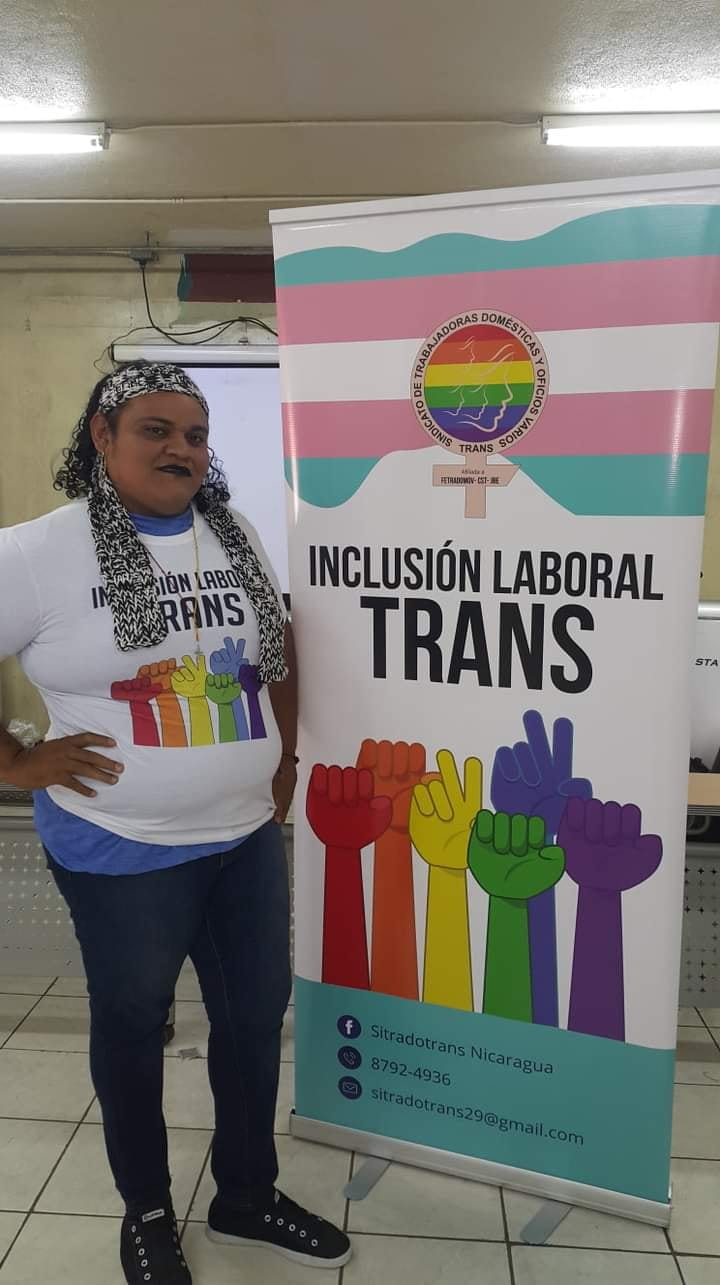
In Nicaragua, FETRADOMOV lobbied intensely for the inclusion of transgender and LGBTQ domestic workers in the worker pool. (Cortesía de FETRADOMOV)

The pandemic did not impede Paraguayan domestic workers during the International Women’s Day. They went out to protest against gender violence and implore the urgent ratification of Convention 190.(Photo Courtesy: SINTRADESPY)

In honor of International Women’s Day, Dominicans affiliated with SINTRADOMES-CASC were taught about gender violence and worker abuse. (Photo Courtesy: SINTRADOMES-CASC)
And there is more. Since March 2020, national and international awards and distinctions have rained down for Latin American organizations of domestic workers and their leaders for their actions in favor of human and women’s rights. Institutions and organizations worldwide also chose our leaders to lead awareness campaigns related to the pandemic and were called “star” speakers at frontline workers’ events globally.
The election of several regional domestic workers leaders to occupy strategic positions in the trade union centers to which their organizations belong deserves a special mention as leaders gained a presence in traditionally male-dominated spaces. And a round of applause for the IDWF regional representative, Andrea Morales, for her new position as a national deputy in Nicaragua, and the Chilean leader Luz Vidal, recently appointed Undersecretary for Women and Gender Equity by Chile’s federal government.
We could not hug each other in two years, as we Latinas, like so many people. But even under the “new normal,” we were close, strong and united. From the IDWF, we worked side by side with our affiliates. We developed a Guide to Health and Safety at Work against Covid-19, collectively built a Toolkit for the Implementation of Convention 189, carried out a collaborative survey to collect information on the effects of the pandemic and designed strategies based on the results (systematized in a policy brief that travelled the world). We supported their actions, involving them in new projects and contributing our grain of sand to alleviate the hunger of many of them and their children. We worked very hard, yes, but we grew and prospered. The satisfactions exceed the effort.

Panamanian domestic workers receive certification on Health and Ocupacional Safety during COVID-19 as a result of a cooperation between SINGRETRADS and the OPS. (Cortesía de SINGRETRADS).
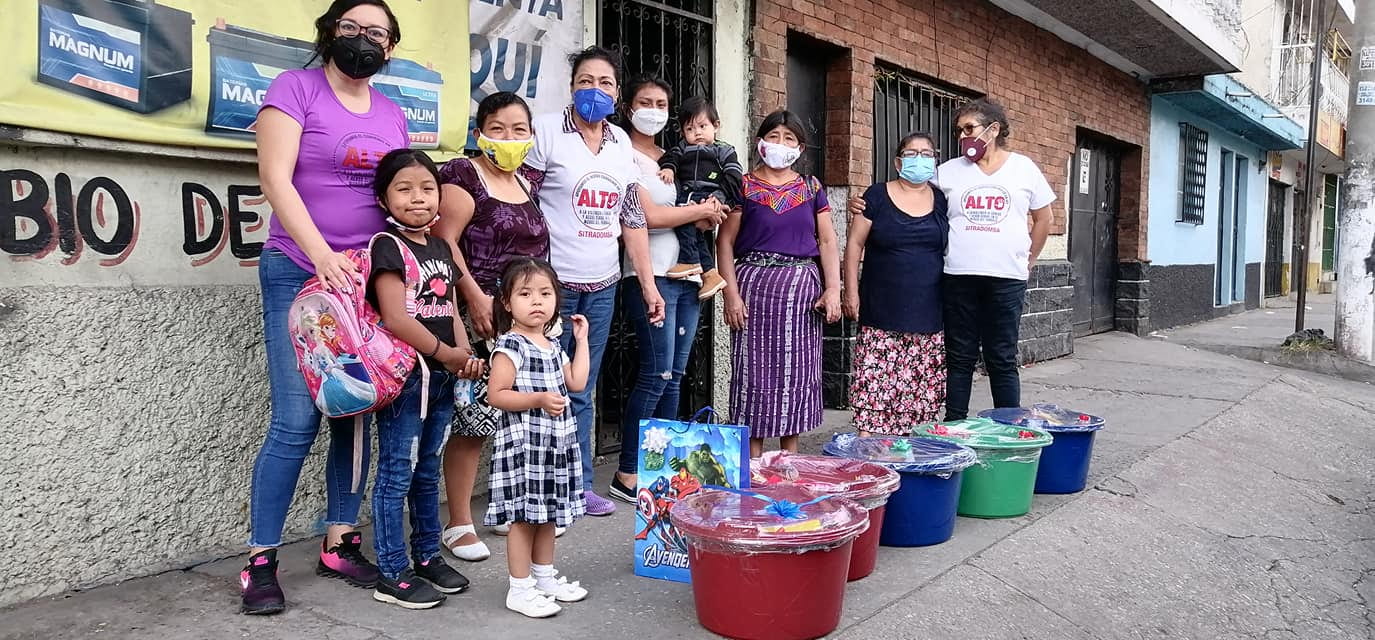
In Guatemala, SITRADOMSA, with the help of the FITH, provides humanitarian aid to its members in moments of public health crisis and unemployment. (Photo Courtesy SITRADOMSA).
Looking to the future
The Covid-19 crisis has shown the terrible lack of protection that domestic workers in Latin America and the Caribbean suffer, but it has also shown that without them, our societies collapse. There is only one way to repair such a contradiction: the Latin American states need to recognize domestic work as work and guarantee it is carried out in decent conditions, equal to those of other salaried sectors.
I wanted to be part of the IDWF to accompany domestic workers in their fight for decent work and social justice. Only from inside an international organization committed to the core of the sector’s demands can a fight be fought. From a distance, it doesn’t work. And seeing my dear leaders in action during the pandemic has left me with the most valuable lesson of my entire life: it can be done; it can always be done!
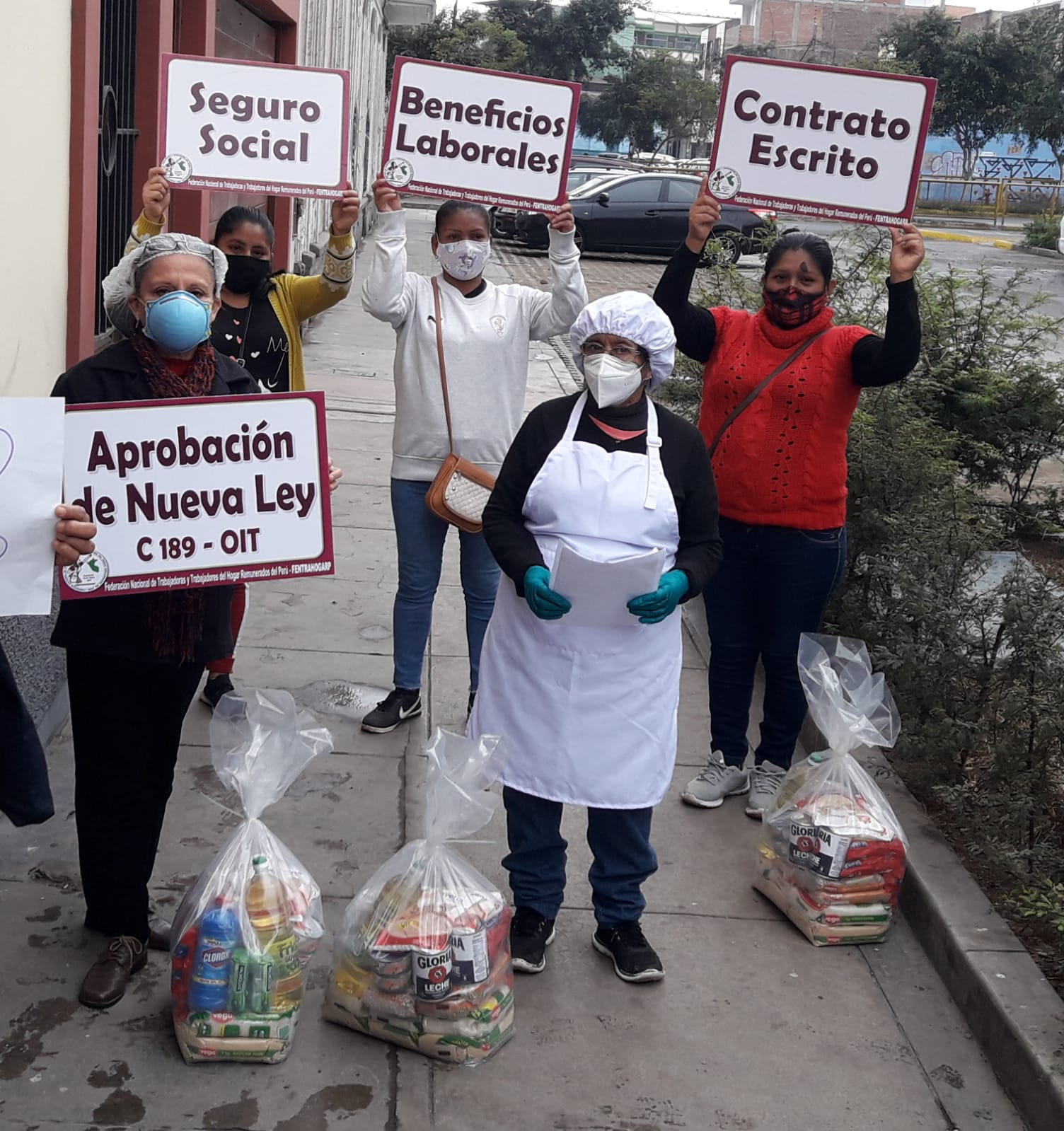
Peruvian domestic workers provide aid to their compatriots and demand the passing of a law for the sector. (Photo Courtesy CCTH).

During the International Day for the Elimination of Violence against Women, Peruvian domestic workers demonstrate their dedication to gender-based causes.(Photo Courtesy: IPROFOTH)
Hablemos de resiliencia
El impacto de la pandemia en las trabajadoras del hogar de América Latina y el Caribe
Por Fernanda Valienti

SINTRADI, de Paraguay, montó una panadería para generar ingresos y dar empleo a las trabajadoras más impactadas por la pandemia. (Cortesía de SINTRADI)
Cuando me uní a la familia de la Federación Internacional de Trabajadoras del Hogar (FITH), en octubre de 2019, no imaginaba que pocos meses después experimentaría el sinsabor y al mismo tiempo el privilegio—las ironías de la vida—de ver al movimiento regional de trabajadoras del hogar peleando una de las batallas más duras de su historia, la originada por la crisis del Covid-19, y saliendo fortalecido de ella.
En los últimos dos años, he sido testigo de cómo los derechos laborales y humanos de las trabajadoras del hogar de mi querida región fueron vulnerados de todas las formas posibles. He asistido a un doloroso despliegue de insensibilidad por parte de empleadores y gobiernos. He visto la injusticia social en su máxima expresión: las mujeres más expuestas a la crisis sanitaria y económica también han sido las más olvidadas y menos favorecidas.
Sin embargo, en estos tiempos también he entendido el significado de dos términos de los que mucho se habla pero no siempre se dimensionan cabalmente: resiliencia y empoderamiento. Lejos de dejarse acobardar por la realidad adversa, las líderes de las organizaciones sindicales de trabajadoras del hogar en la región supieron capitalizar esta crisis inédita, clamando sus reivindicaciones, visibilizando sus derechos e incidiendo para que sus demandas fuesen incluidas en las agendas públicas. Y todo, con una creatividad asombrosa y una visión estratégica que los hombres de negocios envidiarían. Estas mujeres sabias vieron oportunidades donde otros veían desolación. Estas leonas esclarecidas se reinventaron en tiempo récord y, así, cosecharon victorias inimaginables en medio de la tempestad. Es por eso que puedo decir con orgullo que he tenido el “privilegio” de transitar junto a las trabajadoras del hogar de América Latina y el Caribe la crisis del Covid-19. Hoy quiero compartir con el mundo esta experiencia que me cambió para siempre.

Las trabajadoras del hogar peruanas celebran conquista histórica: la aprobación de una ley que equipara sus derechos con los del resto de trabajadores. (Cortesía de FENTRAHOGARP)
Lo que la pandemia nos dejó
Según los últimos datos de la Organización Internacional del Trabajo (OIT, 2021), en América Latina y el Caribe más de 15 millones de personas se dedican al trabajo doméstico. De ellas, el 92% son mujeres y el 72,3% prestan sus servicios en condiciones de informalidad. Además, sus salarios no alcanzan el 50% de lo que perciben otros trabajadores asalariados. Estas cifras muestran una brutal contradicción entre la normativa y la práctica, teniendo en cuenta que, de los 35 países que han ratificado el Convenio 189 de la OIT sobre trabajo decente para el sector a nivel mundial, 18 pertenecen a la región.
En este contexto, las trabajadoras del hogar latinoamericanas y caribenas han sido las más afectadas por la pandemia del Covid-19 en cuanto a pérdida de empleos, reducción de horas de trabajo y disminución de ingresos. Al segundo semestre de 2020, alrededor del 50% de ellas habían perdido su fuente de ingresos y sólo el 9,8% por ciento estaban totalmente cubiertas por la seguridad social (OIT, 2021), lo que implica un acceso limitado a los servicios de salud. En algunos países, los efectos de la pandemia fueron particularmente arrasadores durante el período señalado: en Perú, el 72,1% de las trabajadoras del hogar perdieron su empleo; en Ecuador, el 53,3%; y en Colombia, el 50,6%.

Perú: Trabajadoras del hogar toman las calles para sensibilizar a la población sobre la importancia de reconocer que el trabajo doméstico es trabajo, como cualquier otro. (Cortesía de SINTTRAHOL).
Los resultados de una encuesta promovida por la FITH (2020) añaden que el 14,2% de ellas mantuvieron su empleo, pero con un deterioro de las condiciones laborales. En tanto, el 23,1% continuaron trabajando normalmente, lo que se tradujo en una mayor exposición al virus. Sólo el 13,8% de las trabajadoras consultadas informó que sus empleadores respetaron su derecho a la cuarentena remunerada. Cabe destacar que el 92% de las encuestadas indicaron que el trabajo doméstico era su única o su principal fuente de ingresos. Además, el 68% de ellas representaban el único aporte monetario a la economía familiar.
Como vemos, la desprotección y la informalidad que caracterizan al sector se han manifestado de diversas maneras ante la crisis del Covid-19. Dado que la mayoría de las trabajadoras del hogar no cuenta con un contrato de trabajo por escrito ni está registrada en la seguridad social, muchos empleadores interrumpieron el vínculo laboral durante la pandemia sin reconocerles ningún derecho y sin pagarles su salario. Pero las que conservaron sus empleos tampoco corrieron la mejor de las suertes, sino que sufrieron abusos de toda índole. El confinamiento de familias enteras en los hogares implicó una mayor demanda de servicios de aseo y cuidados. De ahí que muchas trabajadoras domésticas hayan sido forzadas a permanecer en sus lugares de trabajo durante el aislamiento obligatorio, lo que se tradujo en sobrecarga de tareas, jornadas más extensas, falta de descanso adecuado, imposibilidad de ver a sus propias familias, mayor exposición al coronavirus y una alta probabilidad de sufrir los efectos psicosociales derivados de una situación tan estresante.
Por otra parte, pocas fueron las trabajadoras del hogar en la región que pudieron acceder a los mecanismos de asistencia dispuestos por los gobiernos: apenas el 40%, según la encuesta de la FITH. Y esto se debe a dos factores: su situación de informalidad laboral (la mayoría de esas medidas iban dirigidas a trabajadores registrados) y a los dificultosos trámites virtuales requeridos para solicitar dichos beneficios.

República Dominicana: Organizaciones de trabajadoras del hogar marchan para que se respeten sus derechos en tiempos de pandemia. (Cortesía de ATH)
Los efectos de la pandemia han sido particularmente devastadores para las trabajadoras pertenecientes a los grupos sociales menos favorecidos. No es coincidencia que la primera víctima fatal del Covid-19 en Brasil haya sido una trabajadora del hogar de raza negra, de 63 años y diabética, que fue contagiada por sus empleadores al regresar a Río de Janeiro de un viaje a Italia. Pero el pico del horror llegó el 2 de junio de 2020, en la ciudad de Recife (Pernambuco, Brasil), con la muerte de Miguel Santana, el hijo de cinco años de una trabajadora del hogar afrodescendiente cuyo derecho a la cuarentena remunerada no fue respetado por su empleadora. Ante la suspensión de las clases escolares, Mirtes Santana se vio obligada a llevar al niño a su trabajo y dejarlo momentáneamente con su empleadora mientras paseaba al perro de la familia (una tarea que no le correspondía). La dueña de casa, fastidiada, montó a Miguel en el ascensor del edificio rumbo a la terraza, desde donde cayó y perdió la vida. Estas historias nos mueven a una seria reflexión sobre la cuota de responsabilidad de cada miembro de la sociedad en este escenario de injusticia social.

Brasil: En pleno pico de la pandemia, Fenatrad lanzó la campaña “Esenciales son nuestros derechos”, exigiendo formalización y cuarentena remunerada para las trabajadoras domésticas. (Cortesía de: Themis – Gênero, Justiça e Direitos Humanos / FENATRAD)
Nuestras guerreras en acción
Apaludo de pie a las organizaciones de trabajadoras del hogar de América Latina y el Caribe, que en medio de una crisis sanitaria y económica sin precedentes han sido capaces de movilizarse más que nunca para defender sus derechos, poniendo en jaque a gobiernos y empleadores. No alcanzaría este artículo para enumerar todo lo que han hecho estas mujeres en los dos últimos años.
Con la bandera de “Cuida a quien te cuida” en alto, nuestras líderes salieron fortalecidas de la crisis: aprendieron lecciones, se aggiornaron, revalorizaron la unidad regional, hicieron alianzas estratégicas, desplegaron todas sus capacidades a través de fenomenales campañas de sensibilización y visibilización, pusieron en práctica la solidaridad sin reservas, privándose ellas mismas del pan o de un medicamento para aliviar el sufrimiento de sus compañeras. Esta demostración de grandeza las dignifica y enaltece aún más. Y cuando se entregan el cuerpo y el alma de esa manera, los frutos se cosechan aunque la tormenta arrecie.
En el momento más caótico, las trabajadoras del hogar en Perú obtuvieron un triunfo histórico: la aprobación de una ley específica para el sector que equipara sus derechos con los del resto de los trabajadores y que establece la obligatoriedad del contrato por escrito. Las dirigentas de Chile lograron el tan postergado acceso al Seguro de Cesantía y la inclusión en el Ingreso Familiar de Emergencia. Las compañeras salvadoreñas consiguieron al fin que la Justicia fallara a su favor y dictaminase la fijación de un salario mínimo para las trabajadoras domésticas. Las líderes mexicanas llevaron al Congreso su propuesta de reforma a la Ley del Seguro Social. Las luchonas dominicanas lograron acceder al programa “Quédate en casa”, colocaron sus demandas en la agenda del gobierno y hasta fundaron una cooperativa para asegurar la sustentabilidad institucional y promover la generación de ingresos entre sus afiliadas. Las guerreras del Paraguay, a puro esfuerzo y con un presupuesto limitado, abrieron su propia panadería. Las imparables argentinas inauguraron un Centro de la Mujer para asistir a trabajadoras víctimas de violencia de género. Uruguayas, argentinas, ecuatorianas y peruanas asumieron un rol clave en la ratificación del Convenio 190 de la OIT contra la violencia y el acoso laboral en sus países.

Perú: Las trabajadoras del hogar se manifiestan por la ratificación del Convenio 190 de la OIT contra la violencia y el acoso laboral. (Cortesía de FENTRAHOGARP)

Nicaragua: FETRADOMOV aboga intensamente por la inclusión laboral de las trabajadoras del hogar transgéneras y LGBTIQ. (Cortesía de FETRADOMOV)

La pandemia no detuvo a las trabajadoras del hogar paraguayas en el Día Internacional de la Mujer: salieron a las calles para manifestarse contra la violencia de género y pedir la urgente ratificación del C190. (Cortesía de SINTRADESPY)

En ocasión del Día Internacional de la Mujer, las afiliadas a SINTRADOMES-CASC (República Dominicana) se capacitaron en materia de violencia de género y acoso en el ámbito laboral. (Cortesía de SINTRADOMES-CASC)
Y hay más… Desde marzo de 2020, llovieron los premios y distinciones nacionales e internacionales para las organizaciones latinoamericanas de trabajadoras del hogar y sus dirigentas por sus acciones en favor de los derechos humanos y de las mujeres. Nuestras líderes también fueron escogidas por instituciones y organismos de todo el mundo para protagonizar campañas de concientización relativas a la pandemia y fueron convocadas como oradoras “estrella” en eventos de primera línea a nivel global.
Merece una mención especial la elección de varias dirigentas regionales de las trabajadoras del hogar para ocupar puestos estratégicos en las centrales sindicales a las que pertenecen sus organizaciones, ganando presencia en un espacio tradicionalmente dominado por hombres. Y vaya un aplauso para la representante regional de la FITH, Andrea Morales, por su flamante cargo como diputada nacional en Nicaragua, y para la dirigenta chilena Luz Vidal, recientemente nombrada Subsecretaria de la Mujer y la Equidad de Género por el gobierno nacional de su país.
Fueron dos años en que no pudimos abrazarnos, como tanto nos gusta a las latinas. Pero aun bajo la “nueva normalidad”, estuvimos cerca, fuertes y unidas. Desde la FITH, trabajamos codo a codo con nuestras afiliadas, desarrollando una Guía de Salud y Seguridad en el Trabajo frente al Covid-19, construyendo colectivamente una Caja de Herramientas para la Implementación del Convenio 189, realizando una encuesta colaborativa para recavar información sobre los efectos de la pandemia y diseñar estrategias a partir de sus resultados (sistematizados en un policy brief que recorrió el mundo), apoyando sus acciones, involucrándolas en nuevos proyectos, aportando nuestro granito de arena para aliviar el hambre de ellas y sus hijos… Trabajamos durísimo, sí, pero crecimos y nos enriquecimos. Las satisfacciones superan el esfuerzo.

Panamá: Trabajadoras del hogar reciben capacitación sobre Salud y Seguridad Ocupacional frente al Covid-19 en el marco de un acuerdo entre SINGRETRADS y la OPS. (Cortesía de SINGRETRADS).

Guatemala: Con apoyo de la FITH, SITRADOMSA brinda ayuda humanitaria a sus afiliadas en momentos de crisis sanitaria y desempleo. (Cortesía de SITRADOMSA).
Mirando hacia el futuro
La crisis del Covid-19 ha demostrado la terrible desprotección que sufren las trabajadoras del hogar en América Latina y el Caribe, pero también ha demostrado que sin ellas nuestras sociedades se derrumban. Hay un solo camino para reparar tamaña contradicción: que los estados latinoamericanos reconozcan el trabajo del hogar como trabajo y garanticen que se desempeñe en condiciones decentes, iguales a las de otros sectores asalariados.
Quise ser parte de la FITH para acompañar a las trabajadoras del hogar en su lucha por el trabajo decente y la justicia social. Sólo desde el interior de una organización internacional comprometida hasta la médula con las reivindicaciones del sector se puede dar pelea. De lejos, no sirve. Y ver a mis queridas líderes en acción durante la pandemia me ha dejado el aprendizaje más valioso de toda mi vida: ¡se puede, siempre se puede!

Perú: Trabajadoras del hogar entregan ayuda humanitaria a sus compañeras y demandan la aprobación de una ley específica para el sector. (Cortesía de CCTH).

En el Día Internacional de la Eliminación de la Violencia contra la Mujer, las trabajadoras del hogar peruanas muestran su compromiso con las causas de género. (Cortesía de IPROFOTH)
Fernanda Valienti is Program Officer for Latin America at the International Federation of Domestic Workers (IDWF). She is Argentine, mother of Dante, Bachelor of Social Communication, translator, literary editor and writer. She made contact with the union world in 2003, as coordinator of the literary workshops of the Light and Power Union, in Buenos Aires. From then on, she was forever committed to the rights of working people. In 2017, she became involved with the domestic workers’ movement, where she found a second family and professional fulfilment.
Fernanda Valienti es Oficial de Programas para América Latina de la Federación Internacional de Trabajadoras del Hogar (FITH). Es argentina, madre de Dante, Licenciada en Comunicación Social, traductora, correctora literaria y escritora. Tomó contacto con el mundo sindical en 2003, como coordinadora de los talleres literarios del Sindicato de Luz y Fuerza, en Buenos Aires. A partir de entonces, se comprometió para siempre con los derechos de las personas trabajadoras. En 2017, se involucró con el movimiento de trabajadoras del hogar, donde encontró una segunda familia y la plenitud profesional.
Related Articles
Slavery Upstairs, Slavery Downstairs
On February 14, 1800, someone slipped an anonymous letter to the solicitor general of Lima’s high court via one of his domestic servants. When he opened it, the solicitor (fiscal)…
Qualified but Rejected
English + Español
As of 2021, more than six million Venezuelans had left a crisis-ridden country in search of a decent life that is not plagued by food insecurity and the lack of other basic needs. Close to five million of them…
Waiting for Rain
Just before the beginning of the pandemic, I traveled to Sevilla, Colombia, to meet with Yudith Leguí, a participant in my sociological research, whom I first interviewed in 2016 in El…



